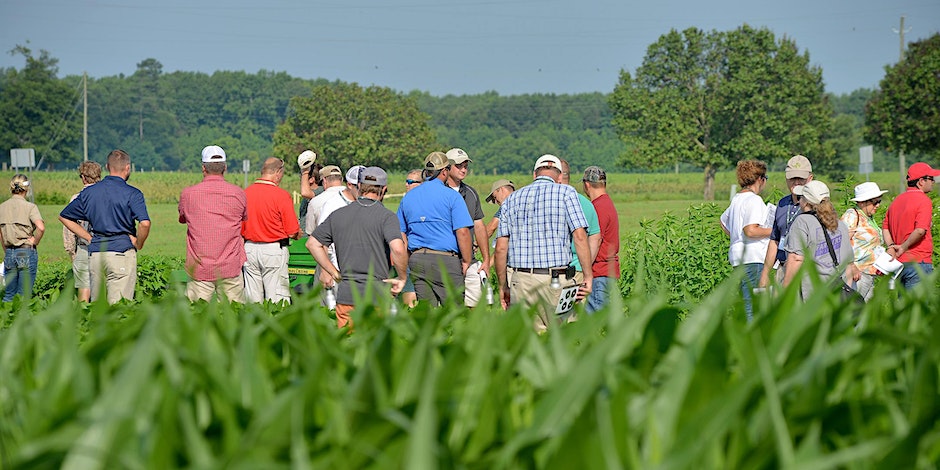Local Research Benefits Grain Farmers
go.ncsu.edu/readext?977596
en Español / em Português
El inglés es el idioma de control de esta página. En la medida en que haya algún conflicto entre la traducción al inglés y la traducción, el inglés prevalece.
Al hacer clic en el enlace de traducción se activa un servicio de traducción gratuito para convertir la página al español. Al igual que con cualquier traducción por Internet, la conversión no es sensible al contexto y puede que no traduzca el texto en su significado original. NC State Extension no garantiza la exactitud del texto traducido. Por favor, tenga en cuenta que algunas aplicaciones y/o servicios pueden no funcionar como se espera cuando se traducen.
Português
Inglês é o idioma de controle desta página. Na medida que haja algum conflito entre o texto original em Inglês e a tradução, o Inglês prevalece.
Ao clicar no link de tradução, um serviço gratuito de tradução será ativado para converter a página para o Português. Como em qualquer tradução pela internet, a conversão não é sensivel ao contexto e pode não ocorrer a tradução para o significado orginal. O serviço de Extensão da Carolina do Norte (NC State Extension) não garante a exatidão do texto traduzido. Por favor, observe que algumas funções ou serviços podem não funcionar como esperado após a tradução.
English
English is the controlling language of this page. To the extent there is any conflict between the English text and the translation, English controls.
Clicking on the translation link activates a free translation service to convert the page to Spanish. As with any Internet translation, the conversion is not context-sensitive and may not translate the text to its original meaning. NC State Extension does not guarantee the accuracy of the translated text. Please note that some applications and/or services may not function as expected when translated.
Collapse ▲ Rotating corn with soybeans can improve soil health, reduce pest and disease pressure, and increase total per acre yields and income, but growers in Cleveland and Lincoln counties hesitate to add corn to their crop rotation due to variability of weather and the high cost of fertilizer. Local growers also find that most of our corn research has been conducted in Union County, the Blacklands, and northeastern NC. As important as it is, this research is not necessarily relevant to local growers. Our region presents its own challenges and opportunities based on our soil types and growing conditions. Local producers needed relevant data to help them make informed planting and growing decisions.
Rotating corn with soybeans can improve soil health, reduce pest and disease pressure, and increase total per acre yields and income, but growers in Cleveland and Lincoln counties hesitate to add corn to their crop rotation due to variability of weather and the high cost of fertilizer. Local growers also find that most of our corn research has been conducted in Union County, the Blacklands, and northeastern NC. As important as it is, this research is not necessarily relevant to local growers. Our region presents its own challenges and opportunities based on our soil types and growing conditions. Local producers needed relevant data to help them make informed planting and growing decisions.
To meet this information need, Heather Schronce partnered with area specialized agent Jenny Carleo to conduct on-farm research that was showcased at the 6th Annual Southwest Piedmont Corn & Soybean Field Day in Cleveland County. The event highlighted data generated from trials conducted in partnership with the NC Soybean Producers Association and replicates of a corn variety trial in Cleveland and 5 other counties in the western Piedmont. The soybean trial consisted of 1 plot with 4 replications of treatments examining the efficacy of “Envita”, a new nitrogen biofertlizer. As the popularity of biological products grow, so does the concern of producers wondering if they really work. Across the state, agents took advantage of funding provided by the NC Soybean Producers Association to test biological products. The corn variety trial also generated data relevant to local growing conditions.
Field days and winter production meetings helped facilitate discussions about ongoing research and Extension efforts to disseminate findings from recently concluded research studies. The 6th Annual Southwest Piedmont Corn and Soybean Field Day drew in 120 attendees from 8 different counties in North Carolina as well as 3 attendees from 2 different counties in South Carolina. Industry partners were involved in this field day and make a point to attend as well as agents and specialists from other counties. The NC Soybean producers association as well as the Corn Growers Association of North Carolina have given $4,000 to support the field day. This event attendance continues to grow each year and is one of the biggest events that N.C. Cooperative Extension, Cleveland and Lincoln County Center hosts. This local data impacts decisions that local growers make with products and variety selection. This localized research initiative is poised to optimize crop production and fortify the collaborative bonds among the Cleveland/Lincoln County Field Crops Programs, County growers, and members of private industries.




